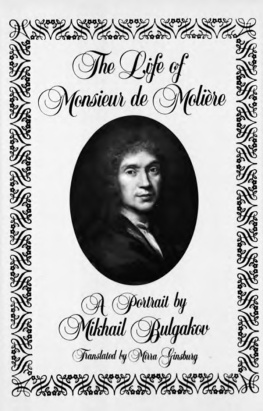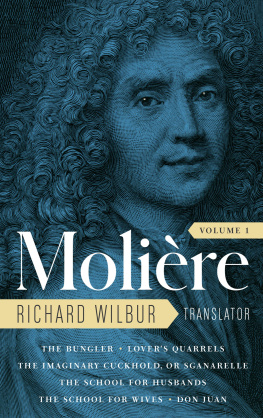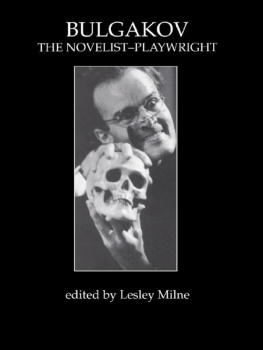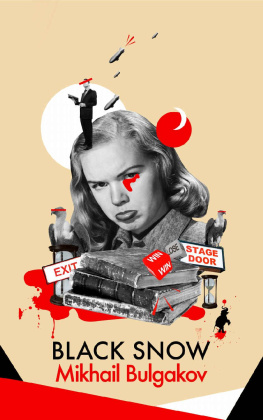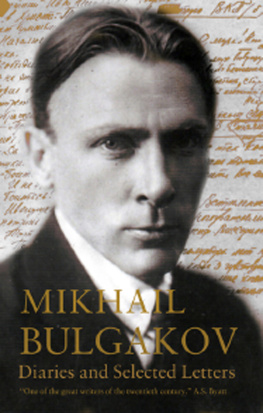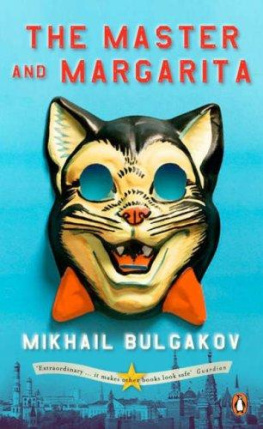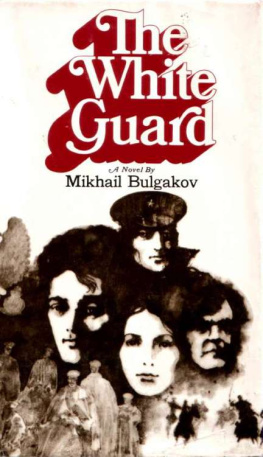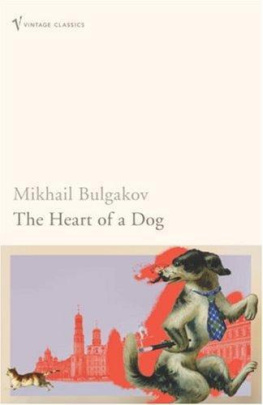
Mikhail Bulgakovs The Life of Monsieur de Molire is more than a biography. It is a book by one artist about another, with whom he feels a deep affinity. There is much besides their craft that links these two men across the centuries. Both had a sharp satirical eye and an infinite capacity for capturing the absurd and the comic, the mean and the grotesque; both had to live and write under autocracies; both were fearless and uncompromising in speaking of what they saw, evoking storms with each new work; and both shared what Bulgakov calls the incurable disease of passion for the theater.
Bulgakov, playwright, novelist, and short story writer, was born in Kiev in 1891, the son of a professor of the Kiev Theological Academy. Graduated from medical school in 1916, he practiced medicine for a short time, then abandoned it for writing. In 1921 he went to Moscow, a city ravaged, cold, and starving after the upheavals of war and revolution, and immersed himself in its miraculously teeming literary life. For several years he worked as a reporter and contributor of short satirical pieces to newspapers and periodicals, writing his first major novel, The White Guard, at night. Only the first part of the novel appeared in 1925. Its characters were members of the Russian gentry intelligentsia. Because Bulgakov treated them with sympathy as human beings swamped by the cataclysms of the time, the novel provoked an outburst of abuse from Communist critics, who branded him a neo-bourgeois, an internal migr, and an apologist for the class enemy. Despite this, the Moscow Art Theatre invited him to dramatize the novel and produced the play in 1926, under the title of The Days of the Turbins. The success of the play was instant and enormous, but, like the novel, it was followed by a storm of violent criticism.
As in Molires case, this set the pattern for Bulgakovs entire subsequent career. A series of brilliant works, success, and the inevitable storm of abuse; plays accepted for production, rehearsed, then banned at the last moment; occasional brief lifting of the bans and their reimposition; and a constant struggle to speak and to be heard. Ironically, the seventeenth century dealt with Molire far more kindly than our own dealt with Bulgakov. Molire was able to write and to produce his works despite the scandals they provoked, thanks to the benevolent patronage of his spoiled, capricious King. A great admirer of the theater, the King was undisturbed by the playwrights thrusts at groups that, for his own purposes, he desired to keep in check. Bulgakov had to cope with a totalitarian state and a totalitarian ideology that would not tolerate dissent or original vision.
By 1930 Bulgakov was completely barred from either publication or production. In despair, he sent a letter to the government, asking permission to go abroad. To him, he said, the ban on his writing was tantamount to a death sentence. Howeverhe went onif he were not allowed to leave, he begged to be given work in his other field, the theater, as a director, an actor, an extra, or even a stagehand. Bulgakov was assigned to the Moscow Art Theatre as an assistant director and literary consultant, and continued in this capacity for several years. He was also permitted to dramatize the works of other writers, among them Gogols Dead Souls and Cervantes Don Quixote. The latter, significantly, was the last of his works to be produced in his lifetime.
Commenting admiringly on Molires courage and persistence after the banning of Tartuffe, Bulgakov writes: And what did the author of the luckless play do? Did he burn it? Or hide it? No. As soon as he recovered from the Versailles scandal, the unrepentant playwright sat down to write the fourth and fifth acts.
Further, prophetically, he says: Yes, the play was banned, but it was impossible to stop its distribution, and it began to spread throughout France in handwritten copies. Moreover, rumors about the play reached other European countries.
Like his hero, Bulgakov, barred from his public, had the strength and courage to go on writing, and he left a large body of work that first began to come to light decades after his death, some of it, indeed, in handwritten or typewritten copies.
A lifelong admirer of Molire, Bulgakov worked on a play about Molire from 1930 to 1936. The play was admitted to production and its premiere took place in February of 1936. After seven performances, successful, as usual, and attended, as usual, by a barrage of official criticism, the play was withdrawn from the repertory.
The biography, dated 19321933, was not published until 1962, thirty years after it was written and twenty-two years after its authors death. Who can illumine the tortuous paths of a comedians life? Bulgakov asks in The Life of Monsieur de Molire. Who will explain to me why a play that could not be performed in 1664 and 1667 could be performed in 1669?
One of the principal themes of The Life of Monsieur de Molirethe relation of the artist to his art and to society, especially a repressive societyruns through much of Bulgakovs work. It is found in his novel The Master and Margarita, in his play on Pushkins death, The Last Days, in his play on Molire, The Cabal of the Hypocrites, and in other works. Another concern that is often evident is anxiety over the fate of manuscripts, of works already created but kept from publication or production. In The Master and Margarita Bulgakovs Satan, Woland, says majestically: Manuscripts dont burn. In The Life of Monsieur de Molire Bulgakov speaks of the disappearance of all of Molires manuscripts and lettersas though conjured away into thin air.
Written during an extremely difficult period in Bulgakovs life and without any immediate hope of publication, The Life of Monsieur de Molire is nevertheless a work of grace and warmth. Like Yevgeny Zamyatinanother of that infinitesimally small group of creative artists who retained their integrity in the face of all pressures to conformBulgakov was not only a master stylist, but also a master of many styles. With great subtlety and sensitivity his writing reflects the spirit, the color, the rhythm, the very tone of the time and the characters he writes about.
In The Life of Monsieur de Molire the point of view is modern, yet also intimately of the period, as though Bulgakov were equally at home in both centuries, as though he were indeed both in the Moscow of the 1930s and also wearing a long caftan and writing with a goose quill. He is bound by no conventions, formal or academic. His attentive presence is felt throughout. He steps as easily out of his time into Molires as he does into the readers company. With complete and charming spontaneity he addresses his characters, or his readers, and this spontaneity is so artful that barriers of time and distance disappear. Bulgakov simply walks by the readers side, and his occasional comment, wry or ironic or affectionate, is as welcome as the voice of a good friend.
The authors extensive research, his striving for absolute authenticity of fact and detail, never weigh down the narrative. Molires difficult and dedicated life is treated with the insight and imagination of a brilliant novelist and playwright. The artist must love his subject, wrote Bulgakov. Because of this love, because of Bulgakovs art and warmth and great sympathy, Molire emerges before us as a living, struggling, and ultimately tragic presence. And his biography reads like an absorbing novel, illuminating both the subject and the author. How infinitely moving, then, are Bulgakovs closing lines in which, suffocating in the vast prison of the spirit that Russia had become, he takes leave of the neglected bronze figure of his hero, sitting over a dried-out fountain in Paris: There he is! It is he, the Kings comedian, with bronze bows on his shoes. And I, who am never to see him, send him my farewell greetings.
Next page
